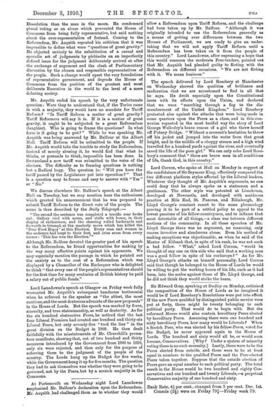Sir Edward Grey, speaking at Dudley on Monday, criticised the
composition of the House of Lords as he imagined it would be if Lord Rosebery's Resolutions were put into effect. If the new Peers qualified by distinguished public service were put at forty, there might be twenty belonging to each political party. That would do to begin with. But the reformed House would also contain hereditary Peers elected by hereditary Peers. Assuming there were one hundred and sixty hereditary Peers, how many would be Liberals P When a Scotch Peer, who was elected by his fellow-Peers, voted for the Budget, he never appeared again in the House of Lords. The hundred and sixty would all be, or would soon become, Conservatives. [Why P Under a system of minority voting there is no such necessity.] Lastly, there were to be the Peers elected from outside, and these were to be at least equal in numbers to the qualified Peers and the Peer-elected Peers taken together. Suppose that the outside election of Peers gave an equal number to each political party. The total result in the House would be two hundred and eighty Con- servatives and one hundred and twenty Liberals,—e, perpetual Conservative majority of one hundred and sixty.










































































 Previous page
Previous page